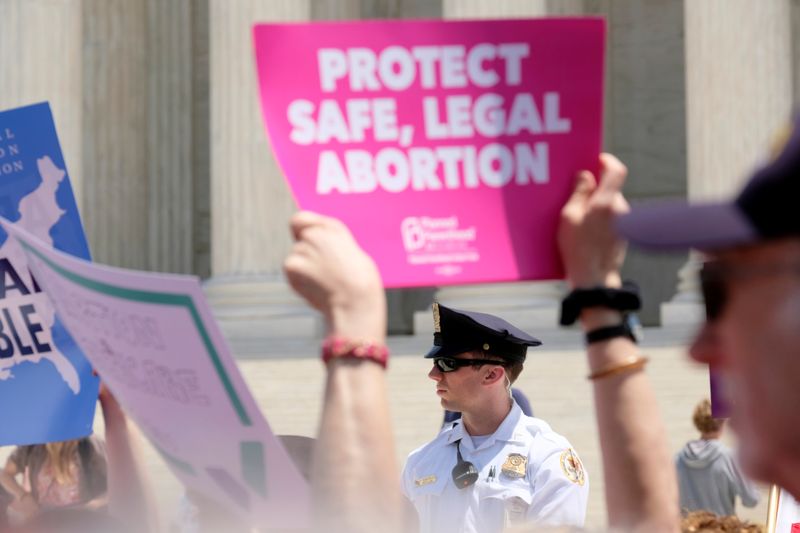By Lawrence Hurley
WASHINGTON (Reuters) - The U.S. Supreme Court this week gets its first chance to consider new curbs on abortion rights with President Donald Trump's two conservative appointees on the bench as it examines the legality of a Louisiana law that could force two of the state's three clinics that perform the procedure to shut down.
The court, with a 5-4 conservative majority, is scheduled on Wednesday to hear arguments in an appeal by Shreveport-based abortion provider Hope Medical Group for Women seeking to invalidate the law. Chief Justice John Roberts may be pivotal in deciding the outcome, with Trump's appointees Brett Kavanaugh and Neil Gorsuch also in the spotlight.
The clinic sued to block the 2014 law, which requires that doctors who perform abortions have a difficult-to-obtain arrangement called "admitting privileges" at a hospital within 30 miles (48 km) of the abortion clinic. A federal appeals court ruled against the clinic and upheld the law.
The Supreme Court struck down a similar Texas requirement in 2016 when conservative Justice Anthony Kennedy, who retired in 2018, joined the four liberal justices to defend abortion rights. Trump has tightened the conservative grip on the court with his 2018 appointment of Kavanaugh, who replaced Kennedy, and his 2017 appointment of Gorsuch.
In their prior stints as federal appellate judges, neither Kavanaugh nor Kennedy ruled directly on abortion rights. But Trump promised during the 2016 presidential race to appoint justices who would overturn the landmark 1973 Roe v. Wade ruling that recognized a woman's constitutional right to an abortion and legalized it nationwide.
The Louisiana case will test the willingness of the court to uphold Republican-backed abortion restrictions being pursued in numerous conservative states.
Roberts, a conservative, cast the deciding vote when the court last year on a 5-4 vote blocked Louisiana's law from going into effect while the litigation over its legality continued.
When the Supreme Court in 1992 reaffirmed Roe v. Wade, it prohibited laws that placed an "undue burden" on a woman's ability to obtain an abortion. In the Texas case, Roberts concluded that an admitting privileges requirement did not represent an undue burden, but he was in the minority in the ruling.
Known to be concerned about the court's institutional reputation and integrity, Roberts may be wary about reversing such a recent precedent even though he was one of the dissenters in the 2016 case.
"Everyone is looking to the chief justice to see what he is going to do," said Nicole Saharsky, a lawyer who regularly argues at the Supreme Court.
Baton Rouge-based U.S. District Judge John deGravelles cited the undue burden precedent when he struck down Louisiana's law in 2016, prompting the state to appeal to the New Orleans-based 5th U.S. Circuit Court of Appeals. The 5th Circuit upheld the law despite the 2016 precedent, concluding there was no evidence any Louisiana clinic would close due to the admitting privileges requirement.
Graphic - U.S. state abortion laws: https://graphics.reuters.com/USA-ABORTION-RESTRICTIONS/010092FK33J/index.html
'OPEN DEFIANCE'
Nancy Northup, president of the Center for Reproductive Rights legal advocacy group representing the Hope clinic, said the justices must know that Louisiana's law was in "open defiance" of their 2016 precedent.
"The real issue for the court in this case is: are they going to follow their own precedent from four years ago?" Northup said.
Louisiana Solicitor General Liz Murrill, who is defending the law, said "big differences" between the Texas and Louisiana laws mean the justices do not need to treat them the same way.
"The state has a significant and compelling interest in showing there's a safe environment. We can't rely on them to do it," Murrill said, referring to the clinics.
The Hope clinic has said implementation of the law would force it and another facility in Baton Rouge to shut, leaving a single clinic, located in New Orleans, for the entire state of about 4.6 million people. The state disputes that finding.
The Hope clinic, in a windowless brick building in Shreveport often with anti-abortion protesters outside, draws women not just from northwestern Louisiana but also eastern Texas and southern Arkansas.
Abortion remains one of the most divisive social issues in the United States, with Christian conservatives among those most opposed to it. A Supreme Court ruling in favor of Louisiana's law could lead other states to pass similar measures.
Abortion rights advocates have argued that restrictions such as admitting privileges are meant to limit access to abortion not protect women's health as proponents say.
Anti-abortion activists are hoping the Supreme Court, with Gorsuch and Kavanaugh and perhaps additional Trump appointees on the bench if he wins re-election on Nov. 3, will scale back or even overturn Roe v. Wade.
Amanda Nottingham, an activist with the Louisiana Right to Life advocacy group that supports Louisiana's law, said the court is "far more favorable now than it was a few years ago."
"Obviously our goal is to see the end of abortion," Nottingham added.
Louisiana's law, Nottingham said, "makes a statement to the rest of the nation that Louisiana is pro-life and we are here to protect women, and we want the highest level of care and safety for them."

[For a graphic on U.S. state abortion laws, see tmsnrt.rs/2WZuiVP]